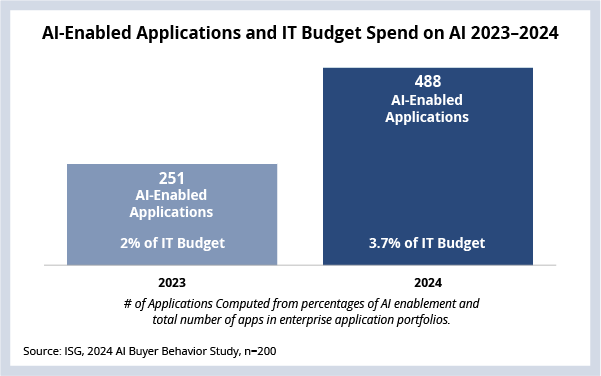Hello. This is Alex Bakker and Loren Absher with what’s important in the IT and business services industry this week.
If someone forwarded you this briefing, consider subscribing here.
Artificial Intelligence
Enterprises are planning to nearly double the number of AI-enabled applications by the end of 2024. Given the size of application portfolios at many large enterprises, this amounts to enabling between four and five applications with AI each week for the entire year. The ambition of this goal demonstrates the challenge enterprises are facing when it comes to AI. On the one hand, there are very few production use cases ready for mainstream deployment at scale, and on the other, AI pilots are meeting or exceeding expectations.

Since the launch of ChatGPT at the end of 2022, AI has been omnipresent in the zeitgeist of the technology industry. What started as demonstrations quickly turned into products and spawned an abundance of pilot projects.
Before the current generative AI boom, there was a slowly growing set of predictive AI capabilities as well. And, while predictive AI will likely run about half of the AI workloads in the market, the conversational interface of generative AI tools has made it abundantly clear – even to end users – that use cases for this technology are expansive.
Based on the results of our 2024 Buyer Behavior Study on Enterprise Adoption of AI, the average large enterprise has an application portfolio of just under 1,800 applications. By the end of 2023, most organizations had AI-enabled about 250 of those applications, and we suspect that the majority of those were using predictive AI approaches. Enterprises are indicating that, by the end of 2024, they will have AI-enabled an average of 488 applications. This is a shift in AI spending from 2% in 2023 to 3.7% in 2024.
What’s Next
For many enterprises, the incorporation of AI into their SaaS applications will happen without direct involvement from their IT staff or service providers. SaaS vendors are already rolling out features in their tools that customers can take advantage of.
But, given the challenges many organizations have had in modernizing and migrating applications to the cloud over the last few years, they face real questions about how to manage the throughput to match their ambitions.
There is a silver lining. We know that cloud migrations requires treating applications holistically and either partially modernizing or rehosting them. When it comes to AI, enterprises seem to prefer to leverage it in limited capacities where the enhancements it offers to individual tasks can add value. If organizations have sufficiently modular architectures and can keep project scopes small, leveraging APIs from Amazon Web Services, Google Cloud Platform or Microsoft Azure to build smaller AI microservices could pose a viable path forward.
Even with control of scope, though, time will be a major constraint on the average IT organization that is, according to our Buyer Behavior Study on ADM, spending half its time and budget on maintenance. While organizations do plan to increase their spending on AI to achieve their goals, the balance that most IT departments must strike between maintenance, security and AI spending and cost optimization will require assistance.
Based on the use cases we collected from IT service providers last fall, many have been preparing to scale AI workloads for the last year and are ready to drive enterprises forward. According to the results from the Q4 ISG Index call, AI is already driving demand in the managed services market.
